- Home
- Peter Grainger
Lane: A Case For Willows And Lane Page 9
Lane: A Case For Willows And Lane Read online
Page 9
Lane said, ‘Watch behind, tell me what he’s doing. At this speed, I can’t check the mirrors.’
As Emily turned to look, they went into a left-hand bend with a screeching of tyres – she was thrown into Lane’s left shoulder but the driver’s arm was braced firmly against the wheel and held her weight off until she could get herself balanced again. Emily caught sight of Lane’s face in profile; the jaw was set hard, the eyes narrowed in concentration beneath just the suggestion of a frown.
Lane said, ‘You alright?’
‘Yes. Sorry.’
‘Tell me when they come again. They will. They’re trying to run us off the road.’
‘Why, for heaven’s sake?’
‘Sheer nastiness. Or maybe that Small bloke has got a thing about his complexion and I went and ruined it. Could be that. He was a real looker before he got bleached, wasn’t he?’
A right-hand bend, and Emily was thrown against the door this time. More cubed crystals of glass fell into her lap, and she thought, how can you be making jokes at a moment like this? Unless something extraordinary happens now, we’re going to end up dead or in intensive care. If I had just sat quietly in my front room… If you had never come to my front door and interfered…
The lights were bright again. She looked behind and said, ‘They’re very close again. Getting closer. Too close!’
The bumpers of the cars collided. It was enough to push the lighter vehicle into an angle across the road and then into a skid as the Volvo eased backwards. Lane countered with the steering wheel and the Skoda wobbled back into a straight line – she was cursing under her breath, words that Emily Willows was unaccustomed to hearing, the sort that made her turn off any television drama that resorted to them. Unfortunately, there was no red button for this one.
Lane said, ‘We won’t survive too many of those.’
‘Surely they’re just as likely to damage their own vehicle?’
‘Nope. You’re not big on cars, are you? See the wall by the side of the road now? If we hit that at this speed, it’s game over. If they do, it’s a dented wing.’
Beyond the stone wall, in the beams of the headlights they could see tall trees, ranks of them – a conifer plantation. Periodically there was a gap in the wall, giving access to vehicles. And there were signs by these entrances but they were travelling too fast for Emily to be able to read what they said.
‘Here we go again!’
Lane swerved to the right, into the centre of the narrow road and the Volvo connected with the nearside rear of the Skoda, heavily this time, giving the two inside the sensation that their car was being lifted from behind by an enormous hand and then dropped again with an alarming crash – somewhere in all that was the sound of crumpling metal and breaking glass.
The Skoda lurched then to the left and two wheels climbed onto the verge. Lane fought with the steering again, and again she had it back under control, easing it down off the grass, and then they hit something very hard, the car leaping up and sideways before landing onto the road. They were still moving forward and fast, but now there was a clattering, clumping sound from the nearside front wheel; when Lane tried to accelerate, the sound became considerably louder and the whole car began to shudder.
Emily said. ‘What just happened?’
‘Best guess is we hit a stone out of that wall. It’s buckled the front wheel.’
‘Oh.’
Lane dropped down a gear and experimentally turned the steering a little to the left and then to the right. It made no discernible difference.
Emily said then, ‘That’s bad, isn’t it?’
‘Yes – definitely bad.’
‘So, what do we do?’
‘Not sure. Never been in a situation quite like this. But I reckon the tyre will blow soon if the wheel is badly buckled, which it is. Then we’re just coming to a halt somewhere ahead.’
‘I see.’
They passed another of those entrances into the forest, and Lane looked hard into it.
‘Can you run?’
‘Almost certainly not far enough or fast enough. But I know you can. You could get away and maybe find some sort of help. I know you think he’s after you more than me now. I might be alright.’
Lane glanced at her.
‘Seriously? You fancy the odds on that?’
‘The odds? I’ve never gambled in my life, and I don’t intend to start gambling with it. But if we just grind to a halt on the road, they catch both of us, don’t they?’
The car behind had dropped back a little – could they see that they had done some damage?
‘Fair point. Take the gun out of the glove compartment and hold onto it to tightly. But don’t pull the trigger, just in case.’
‘What are we going to do?’
Lane liked the ‘we’; the old dear had more spirit than some of the people she’d been with in corners not as tight as this one.
‘If there’s just one more entrance into this wood, we’re taking it. Obviously made for vehicles, so they must go somewhere. Dog-walkers or something… If and when we have to leave the car, just follow my lead. How’s your night-vision?’
‘I don’t have the faintest idea.’
‘Mine’s good, so – here we are, forty metres. Left turn, Clyde!’
Lane had braked late and hard, no handbrake this time, and somehow she had managed to swerve the Skoda in through the gap in the stone wall. The beams from the headlights bounced wildly up and down the trunks of trees as she launched the car down the track, which appeared to be so uneven compared to the road that one hardly noticed the buckled wheel.
Emily Willows turned in her seat and saw that the Volvo too had made it through the entrance, and she had a sinking feeling then that the men behind them had achieved their aim; they were slowly boxing in their intended victims. This forest track led nowhere but into more darkness – there was no hope now of finding a friendly stranger, and as for the police… Well, if they hadn’t caught up with them on a busy A road, what chance was there here? The two of them were on their own, and most of this dark, dark night still lay ahead.
Lane said, ‘Oh, bugger…’
The Forestry Commission doesn’t allow vehicles very far into these woods, even the ones with public access. Naturally enough, they use a tree to control matters – a tree trunk, to be precise, placed horizontally between two vertical posts, held there by gravity and a pair of open brackets. They don’t use the biggest trunks, of course, just the stem of a larch or a lodgepole that can be lifted out of the way in a moment by a couple of hefty lumberjack types, just a mere stripling of a tree some ten inches in diameter. And perhaps four feet from the ground beneath. That’s what Lane was thinking as they approached the tree trunk, hardly slowing down – it must be at least four feet from the ground.
‘Duck. Cover your face.’
Perhaps not quite four feet. The trunk connected with the very top of the windscreen, just the last two or three inches, but that was enough at the speed they were doing to smash it into ten thousand fragments. As the screen imploded, the log was forced upwards and out of the brackets by the impact. It rolled over the roof of the car and then down across the rear window, but it had been carried far enough by what was left of Emily’s car not to drop back into the brackets – it fell with a thump onto the track behind them.
Emily had ducked down into the passenger’s foot-well, and she did not see what Lane saw in the driver’s wing mirror. The Volvo had braked hard, too hard on the dry, sandy surface of the track, and collided heavily with the tree trunk. That might have done them some damage or it might not – either way, they were not driving around it. If they wanted to come on and finish this, they had to get out and move that log if they could. Maybe this was over now.
Lane thumped the steering wheel as she drove along the track, which was climbing steadily up and away from the road, and she said to Emily, still brushing more glass out of her hair down in the foot-well, ‘I tell you what, Emily – these
Skodas really are built a lot better nowadays.’
At the exact moment that the tree-trunk broke the windscreen, Detective Constable Leanne Cross, office manager for Criminal Investigations Unit One at Bodmin, received an email notification. She went to her inbox, read the message and noted that there were three attachments. She did not open them; the message stated specifically that Assistant Chief Constable Russell was to have first sight of these documents.
At this time of night, Leanne Cross doubted whether the ACC would be in the building. She spoke by phone to Detective Superintendent Harley instead and he told her to forward the email to his account; he would contact the ACC, whom he happened to know was still present. When the email and its attachments arrived, Harley sat and stared at the screen, hovering the cursor over the attachment that was labelled “Lane, S. D.I. Service Record” but he did not open it until Russell was in the room and had glanced at what was on his screen. Then Russell nodded and the material began to download.
As they waited, Harley said, ‘I wasn’t expecting to get this, not tonight. Someone must have pulled some strings, sir.’
The assistant chief constable shrugged and said nothing.
They read through the service record together, screen by screen. Harley read more quickly and had to wait until Russell reached the end of each page – then he nodded and Harley clicked page down. Neither man spoke a word until they had completed the first attachment.
Then Russell said, ‘I remember this now, the thing that finished her. Was it three years ago? Yes, there’s the date. Almost three years. It made the national news. The television news…’
‘She ended up in Security Command. What’s that, sir?’
‘A specialist unit. Responsible for anti-terrorist policing at Heathrow – all the London airports, I think. And it has a wider security brief as well, I believe; you know, the less official sort.’
‘Hmm. Well, that pretty much describes Detective Inspector Lane, sir. The less official sort.’
‘An extraordinary service record – I’ve never seen anything like it. Everyone’s career has highs and lows but hers had nothing else. In eight years she went from a rookie on the beat to DI, and on the way she got three citations for bravery and was subject to the same number of disciplinary procedures. Open the citations folder.’
Police Constable Lane had been in the Metropolitan force only a matter of weeks when she and a colleague had been attacked by a gang in the stair-well of a tower block in Tottenham. Her partner had been injured, badly cut by a broken bottle, and armed only with her nerve and her standard issue baton, she had held off the thugs until support arrived. There was a footnote that one of the assailants later attempted to bring a prosecution because she had used excessive force and fractured his skull, but this had been unsuccessful.
Two years later, and already out of uniform, Lane had been one of four officers in a vehicle that was in pursuit of another being driven by known drug dealers. After a high-speed chase across the capital, the target vehicle had left the road near Sunningdale and ended up in the Thames. “Without any thought for their own safety”, the citation read, “Officers Millington and Lane entered the water, found the vehicle, which had already submerged, and pulled out the two occupants, undoubtedly saving their lives”.
Russell said then, ‘And getting them a six and a four-year stretch into the bargain.’
But it was the third and final story that held the two men’s attention. Lane, now a detective inspector with Security Command, had been involved in an extended investigation into suspected terrorist activity centred on Heathrow. Two men and a woman employed in the baggage-handling process had been found, through lengthy analysis of their social media profiles, to have political sympathies at odds with their duties at an airport. Not a crime in itself, naturally, but it had then become clear that a particular transatlantic flight was being discussed. When a known activist was seen to enter the property in Enfield where two of the suspects lived, the decision had been taken to apprehend all three at the end of their shift early the following day, which was the day of the flight.
At dawn on a September morning, DI Lane was positioned on one of the airport’s exit roads as part of the outer ring of security for the arrest operation – she had with her one junior officer. Harley wondered as he read this whether she had been placed there on purpose, away from the likely flashpoint; senior officers, off-duty, will admit that they always take such things into consideration.
The female suspect had been arrested but managed to shout a warning to the others. They had got back to their vehicle and evaded all attempts to stop them. They were seen to be armed with at least one handgun. By the time Lane’s detective constable had received and relayed this message to her, she had already spotted the car speeding away from the handling area where the arrests were to have been made.
She got out of the unmarked police vehicle, stood in the centre of the road and aimed her service weapon where the car would appear in a very few seconds. When, having seen her, it made no attempt to slow down, she fired a warning shot – the officer with her confirmed this, that her first shot had been aimed above the oncoming car. Instead of slowing, the car accelerated rapidly and was driven into Detective Inspector Lane. She was moving and turning to the side when it hit her, a glancing blow but at high speed. She was thrown into the air and landed on her back. At this point, her partner said, he thought she had been killed.
Perhaps the occupants of the car thought so, too. For a reason that was never satisfactorily explained, it skidded to a halt; one possibility considered in the citation was that the terrorists, their plot being now discovered, had intended to shoot the other police officer at the scene. The passenger got out and took steps towards him, not realising then that the woman they had run down was still very much alive.
Lane had rolled onto her front. She crawled several feet to where her gun had landed, and then, holding it in front of her with two hands, she began firing at the man on the road. He ran back, and she did not hit him, but it wasn’t over yet. In his statement, the detective constable said that Lane’s face was covered in blood and he did not know how she could see to shoot but as the vehicle began to move away, she aimed again and took one more shot at the car. Whether by luck or judgement, it hit the front tyre and burst it. They drove on, of course, but the delay was enough, and both were apprehended inside the airport perimeter. Twenty five years each for conspiracy to commit an act of terrorism, with concurrent sentences for attempted murder, and the woman received twelve for aiding and abetting.
Serious internal injuries, a fractured skull, a broken hip and a shattered femur. Those were career-ending from the moment it happened but Lane had fought the establishment every inch of the way – the service record did not state this explicitly but ACC Russell was expert in reading between the lines of official documents, and he should have been as it’s what he spent most of his days doing. Lane had refused to go quietly and that explained the long period between her injuries and her official discharge, which was almost eighteen months ago . During the same period she had been given a bravery award by the Police Federation – accepted on her behalf by a senior officer – and more strikingly, she had been shortlisted for the Queen’s Gallantry Medal. Russell wondered whether that had not been given to her in the end because they were afraid that she wouldn’t turn up to that ceremony either.
Superintendent Harley sat back in his chair and said, ‘Phew! The newspapers didn’t do it justice.’
Russell said, ‘Open the disciplinary attachment.’
Chapter Eleven
They ran out of track after less than a quarter of a mile; it just ended in a heap of brashings from where the workers had been clearing the under-storey of the forest. Lane turned off the lights and the engine immediately, and got out of the car. Looking back down the hill, she could still see the beams from the Volvo where it had been stopped by the log, which meant that the men would have been able to see where the Skoda had g
one, how far it had gone and that it had now stopped. If she had been able to get out of their line of sight, they might have believed the women had finally escaped but now the men knew that they had not got very far at all. And something else, Lane thought – they have not reversed out of the forest, they haven’t retreated. They’re still down there, watching us and deciding what to do.
She heard Emily getting out of the car and feeling her way around it until she was standing beside her. There was no moon at all, at least not yet, but in the starlight Lane saw that the gun was being held out towards her, handle first as if Mrs Willows had been doing this sort of thing for years. Lane took the weapon and checked with her thumb that the safety catch was still on.
Emily Willows said, ‘They’re still down there.’
‘Yes. And they can see where we’ve stopped.’
After the roar of the engine along the bumpy track and the rush of air with most of the Skoda’s windows gone, the night around them now seemed preternaturally quiet. There was a pause before Emily spoke again, in a low voice, as if she was reluctant to disturb it.
‘I cannot believe that they will now continue this. What on earth would be the point?’
Lane was still watching the headlights down below, looking for any sign of activity in front of them, and her eyes didn’t move from that as she said, ‘You mean the logical point? None whatsoever. But I don’t think you’ve met many people like this before.’
Her mouth twisted then in brief irritation because she had invited the question that would inevitably follow.
‘And you have? Where? When?’
Lane didn’t answer – one of the lights down there had flickered momentarily as a figure passed in front of it. Were they checking the tree trunk, seeing if they could move it? Inspecting the car for damage?
‘Miss Lane. I accept that I might owe you my life, assuming that we do get out of this alive. But I think that you also owe me something of an explanation. How do you know anything about “people like this”?’

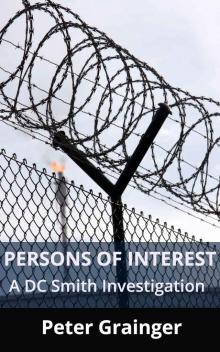 Persons of Interest
Persons of Interest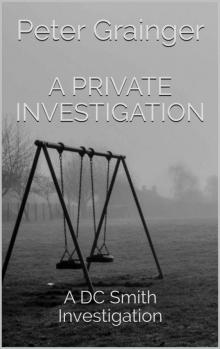 A Private Investigation
A Private Investigation Songbird
Songbird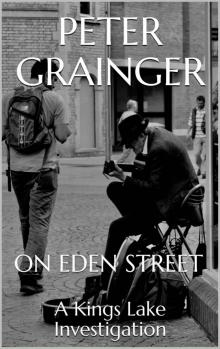 On Eden Street
On Eden Street An Accidental Death
An Accidental Death Time and Tide
Time and Tide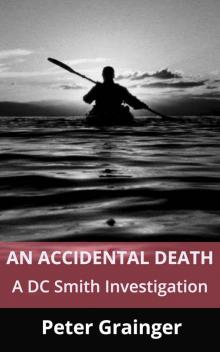 An Accidental Death: A DC Smith Investigation
An Accidental Death: A DC Smith Investigation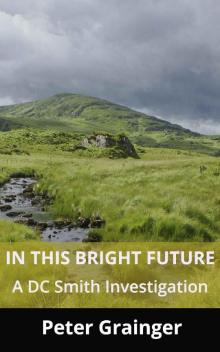 In This Bright Future
In This Bright Future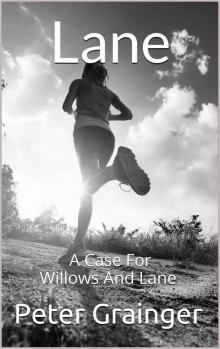 Lane: A Case For Willows And Lane
Lane: A Case For Willows And Lane The Rags of Time: A DC Smith Investigation
The Rags of Time: A DC Smith Investigation Luck and Judgement
Luck and Judgement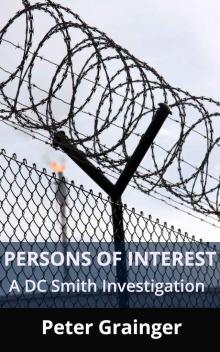 Persons of Interest: A DC Smith Investigation
Persons of Interest: A DC Smith Investigation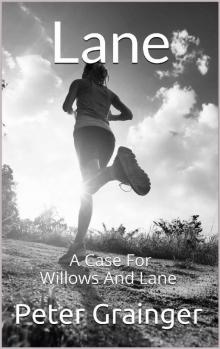 Lane
Lane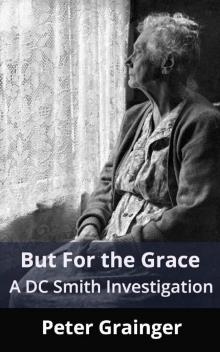 But For The Grace
But For The Grace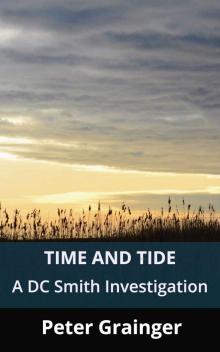 Time and Tide: A DC Smith Investigation
Time and Tide: A DC Smith Investigation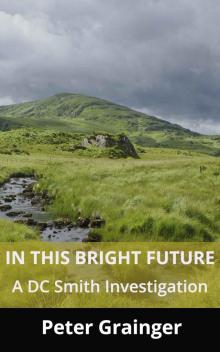 In This Bright Future: A DC Smith Investigation
In This Bright Future: A DC Smith Investigation The Rags of Time
The Rags of Time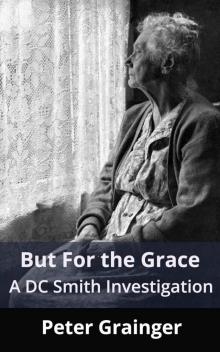 But For The Grace: A DC Smith Investigation
But For The Grace: A DC Smith Investigation Luck and Judgement: A DC Smith Investigation
Luck and Judgement: A DC Smith Investigation